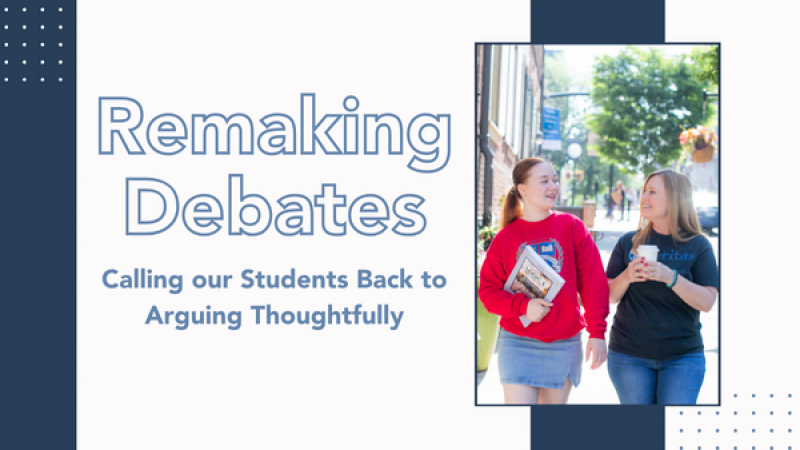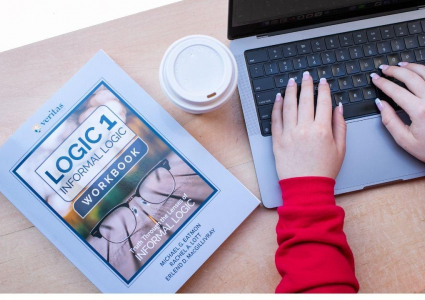Remaking Debates: Calling our Students Back to Arguing Thoughtfully

Our age is not a thoughtful one. It is intentionally thoughtless and misleading. There are many reasons for this, but we should first blame ourselves. The church should be leading our culture and our communities. Instead, too often over the last hundred years, American Christians have mimicked the world and followed the thinking of the world rather than following the example of Christ and thoughtful argumentation.
I live in a place where churches are committed to peace. Sometimes, they put me to shame to the extent of their forgiveness. At other times, something important is missing from these churches. They avoid debate or even discussion of contentious issues for the sake of “peace.” Too often, that leads to radically different approaches to issues from church to church, eventually leading to distention and separation.
A commitment to “peace at all costs” is not the only reason we are bad at debate, argument, and discussion. We have become a culture that prizes “gotcha” quotes, hot takes, and false offense-taking. If we cannot have deep discussions, debates, and arguments, we are like a body without an immune system. We must be a people that tests the spirits and ideas being championed in our day.
So, how can classical Christian teachers train their students to debate and argue about important truths without giving way to unrighteous anger, unjust sarcasm, and arguments that move the passions against right reason? Here are three suggestions:
Suggestion 1: Remember to Fail Quickly, Often, and Shamelessly
Arguing is risking vulnerability and failure. To argue and to be argued with is to risk vulnerability and loss. This is hard for anyone—it is terrifying for 7th through 9th graders. If you don’t help these students become courageous, they won’t be able to handle this sort of back-and-forth in 10th through 12th. They might not ever develop this courage.
I used to coach Middle School Girls' Basketball. I have four daughters. Middle School Girls’ Basketball is the most exciting sport ever. You never know what will happen next. I used to tell them that we were 5,000 mistakes away from being a good team and let's make those mistakes as quickly as possible. Discuss issues. Have fun with the discussion. Help students laugh at themselves and laugh at their mistakes.
Foster courage before correctness. We want both, but you don’t get a chance to shape correctness without fostering courage. You can do this by avoiding correction—or at least shameful correction. When a Middle School Girls’ Basketball player blows it, what do you say when she comes out of the game? The answer is, “Good job!” (if she plays hard and makes mistakes aggressively). I know that this might offend some people’s sense of truth. I mean, the truth is Veritas, right? If the standard is being aggressive, taking risks, and being vulnerable, then it is true.
Suggestion 2: Provide them with Good Models Instead of TV Clips
Neil Postman said that TV conveys entertainment. That’s all it does. While I would love to show videos of people involved in erudite, meaningful debates, I have stopped hoping that any of this comes from political, or at least Presidential, debates. Gore’s lockbox and Sarah Palin’s pivot to the question she would like to answer caused me to stop using Political debates with my students. The first Trump v. Biden Debate made me drive a stake through the heart of current politics as anything we should teach students to model.
Provide models by making debate a normal part of your school’s life. Start with adults. Have your teachers debate before your students. Invite people that your school disagrees with to interact with your students. With juniors and seniors, people argue for positions against our deepest commitments. We have two goals for our students: first, they would learn to treat the person as someone made in the image of God because he or she is made in the image of God; second, they would ask the presenter the most challenging questions they can create. (The presenting adults know that these are our commitments, and because real discussion and debate are rare, they often enjoy this interaction.) When you do this, make sure that you are doing some coaching before and following up after the debate. The bottom line is that eventually, these students will leave your school or your home. It is your job to make sure that they are ready.
If you are in a homeschool setting, finding opposing opinions used to be more difficult, but in our day, there are some solutions. You should see if local government or public school board meetings would serve as a foil.
Suggestion 3: Make Debates Part of Normal Life….Abnormally
This can happen with teachers debating teachers, but other things need to be done. Look out for issues with a normal split in the class—this is especially effective if the students are 9th or 10th graders. When they are split, assign them the defense of the opposite position they believe. This causes them, optimally, to concentrate more on making persuasive arguments and less on their passion for a particular point of view.
One of the areas where this has been profitable for me is the issue of infant baptism. I once had a class of 12, with six who were for infant baptism and six who were against it. I made them switch positions, and we came up with one of the best baptism debates we had the first time we tried this event. (Ensure you let their parents know what you are doing.)
The abnormality of arguing for something that you don’t believe has particular benefits that help students learn to debate well. When you are not passionate, you think about the argument's structure and persuasiveness. Also, it teaches you to think through and make your opponent's arguments as strong as possible to give your opponent the benefit of the doubt instead of trying to catch them in a slip-up (like most TV News now does).
Closing Statement
So, debates are important. We need to prepare students to be ready to enter into them with ferocity and graciousness. We need to look past the easy models of what passes for political debate today and train our students to go deeper, to be comfortable going deeper, and to deal persuasively with the ideas that are foundational to our civilization and are important in our day.






